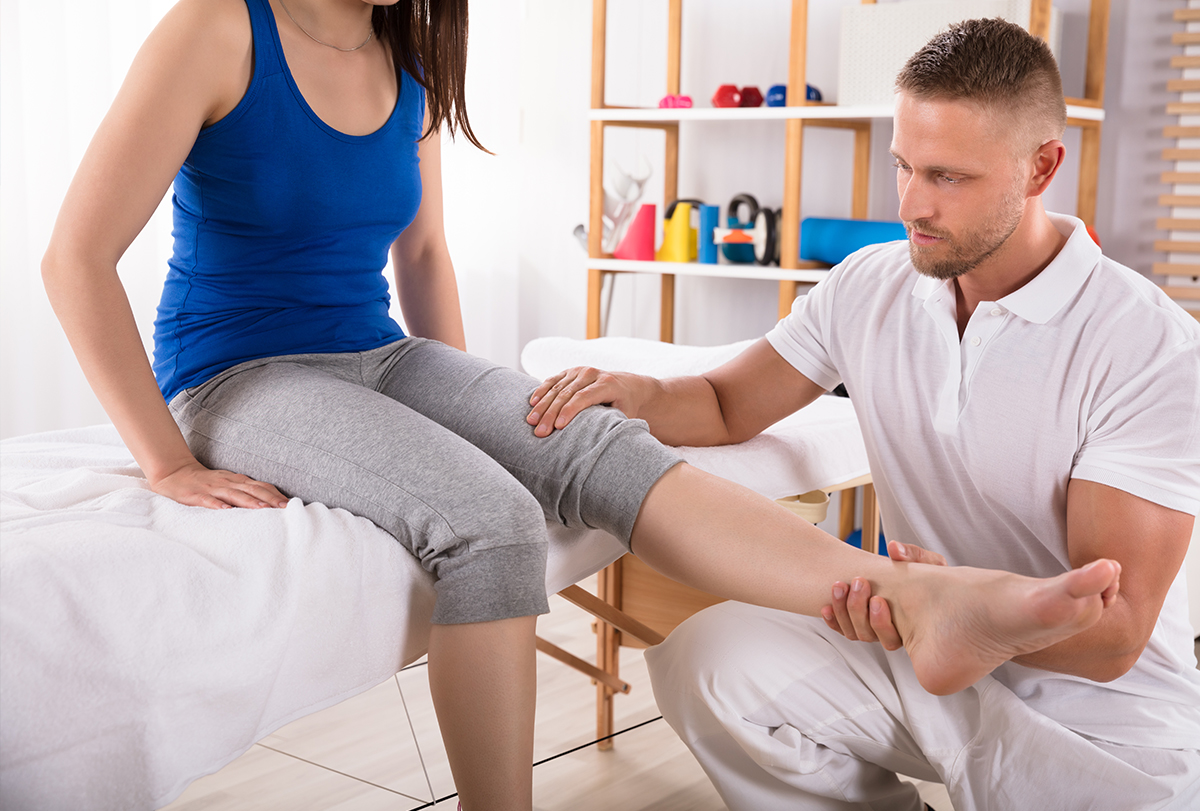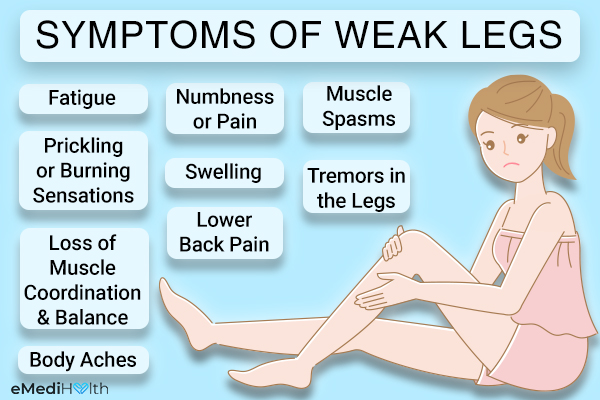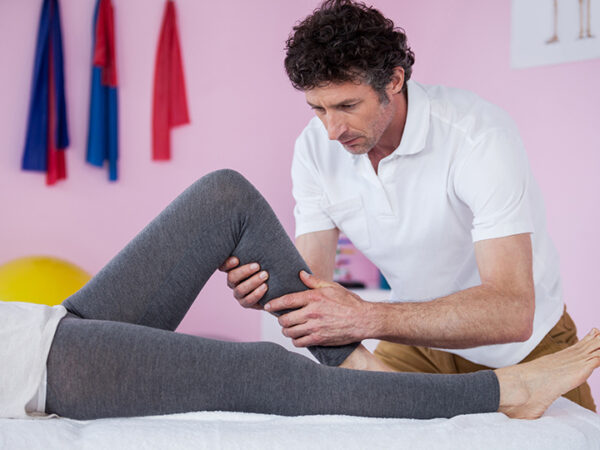In this article:
Your legs have to carry the entire load of your body and they are bound to run out of steam from time to time. While it is normal to experience weakness in the legs after a physically exacting task, you tend to get over it rather quickly after getting proper rest.

Weakness is essentially a feeling of diminished strength or energy, which can result from either a physiological cause such as loss of muscle strength or can be purely psychological in nature.
Asthenia is a broad medical term that is used to define both true and perceived weakness. Loss of strength in your legs essentially means that you will have to make more effort than usual to move them. This kind of muscle weakness can vary in severity and can affect one or both of your legs.
The impaired motor function is referred to as monoparesis if it is limited to just one limb and paraparesis if the weakness extends to both the legs. Overworked leg muscles can also give rise to some degree of pain. Thus, you may be able to move your legs, but it will hurt every time you do it, which will further deter mobility.
Signs and Symptoms of Weakness in Legs

Leg weakness may be accompanied by the following symptoms:
- Fatigue with strenuous or prolonged activity
- Numbness or pain in the lower leg muscles and foot
- Muscle spasms
- Prickling or burning sensation
- Swelling due to overworked muscles
- Pain in the lower back
- Body aches
- Tremors in the legs
- Loss of muscle coordination and balance resulting in frequent falling or tripping accidents
Causes of Weak Legs
Leg weakness can be due to a number of reasons.
a. Common causes

1. Strenuous physical activity
When you push your legs beyond the regular degree of exercise that they are accustomed to or engage in a physically exacting task for an extended period, your leg muscles tend to become tired and sore.
2. Poor sleeping schedule
Your muscles constantly remain active throughout the waking hours and get rested, repaired, and rejuvenated during sleep. However, if you are sleep deprived regularly, the muscle strain will build up over time and lead to extreme physical exhaustion.
3. Fatigue
Weak legs can also be a manifestation of overall fatigue or tiredness. Busy, overworked lifestyles with no time for rest can drain your body, whereas sedentary lifestyles will reduce your threshold for physical activity and make you tire easily.
Fatigue can also be a result of underlying anxiety, stress, or boredom, but the consequent exhaustion tends to go away once you deal with what is bothering your mind.
4. Nutritional deficiency
Weakness in the legs can also be the body’s way of telling you that you are running low on certain essential nutrients, such as vitamin D, calcium, iron, and magnesium, or electrolytes, such as potassium and sodium, all of which are required by the body for building and maintaining strong, healthy bones and muscles.
Potassium deficiency, in particular, can induce hypokalemia, which leads to cramping of leg muscles.
5. Trauma
People tend to lose some degree of strength in their legs in the wake of a serious physical injury such as a sprain or fracture, which may resolve over time.
6. Arthritis
Arthritis encompasses a group of musculoskeletal disorders that lead to the progressive degeneration of muscles, ligaments, tendons, bones, and/or joints. Weakness and pain in the legs are the most common complaints reported by patients with arthritis.
7. Aging
Everyone suffers from the gradual breakdown of muscle mass and the resulting loss of muscle strength brought on by increasing age.
As age increases, “some elderly people will experience general leg weakness due to inactivity,” as stated by Dr. Estelle Farrell, a physiatrist at Vibrant Health Care, Valley of The Sun Institute for Pain Management, Pima Pain Center.
8. Postsurgical recuperation
Inadequate rest and follow-up care after a leg surgery can give rise to muscle weakness in the affected leg.
9. Poor blood circulation
Reduced or inadequate blood supply to your lower limbs can make your legs feel utterly weak.
10. Varicose veins
Varicose veins are swollen, knotted veins that can be quite painful and mostly affect the legs. They are especially prevalent in women.
11. Pregnancy
Pregnant women tend to get bloated hands, ankles, feet, and face due to the underlying fluid retention and reduced blood circulation since the body has to supply blood to the fetus as well.
This swelling can cause nerve compression and give rise to weakness, loss of sensation, and tingling, particularly in the lower half of the body.
b. Neuromuscular causes
1. Functional limb weakness
This is simply a perceived weakness that is not related to a clearly recognized neurological disorder. (1)
2. Multiple sclerosis
This illness can severely hamper your ability to move your limbs on account of increased muscle exhaustion. (2)
3. Charcot-Marie-Tooth disease
Charcot-Marie-Tooth disease can make your limbs considerably weak due to the progressive loss of muscle mass and sensory function. (3)
4. Guillain-Barré syndrome
GBS is a rare but acute neurological disorder wherein the immune system mistakenly targets the healthy peripheral nerves located outside the brain and spinal cord.
Early-stage GBS may give rise to some degree of muscle weakness, tingling, and pain in the extremities (feet and hands), which can rapidly progress to disable the entire body. Children tend to be the worst affected and may exhibit difficulty in walking. (4)
5. Distal muscular dystrophy
The loss of muscle function caused by distal muscular dystrophy usually begins in the lower legs and arms before spreading to other parts of the body. (5)
6. Myasthenia gravis
The disruption of communication between the nerves and the muscles can lead to periodic episodes of skeletal muscle weakness. (6)
7. Parkinson’s disease
PD is a progressive form of a neurodegenerative disorder that primarily affects your motor system. (7)
c. Spinal conditions causing leg weakness

1. Slip disc/herniated disc
This condition involves the displacement of a cushioning disc located between the spinal vertebrae. These discs absorb any kind of a shock to reduce the risk of spinal injury.
2. Lumbar spinal canal stenosis
This condition is often associated with pain and numbness in the lower limbs. It can give rise to radiating back pain that extends to the legs.
3. Sciatica
It is characterized by shooting pain that stems from the lower back and runs down through the buttocks, down the back of each leg, sometimes culminating in the foot.
d. Other conditions
1. Diabetic neuropathy
Leg weakness can also be a symptom of nerve damage caused by long-term diabetes. When the peripheral nerves become irritated, you may experience a gradual loss of strength in your extremities such as your feet and hands.
2. Alcoholic polyneuropathy
Overconsumption of alcohol for a prolonged period can drain out essential nutrients such as thiamine (vitamin B) from the body and thereby trigger considerable nerve damage, which is characterized by muscle weakness, cramps, spasms, and aches.
3. Stroke (sudden weakness)
A stroke can send your entire body into a state of disorientation by disrupting the transmission of neuromuscular signals that control your motor function. Tingling, loss of sensation, and sudden weakness in the lower limbs are all common indicators of stroke.
When to See a Doctor
Leg weakness can be a sign of a serious illness. Depending on the type of weakness, the problem can be traced back to a disorder of the central nervous system or peripheral nervous system, vascular, trauma, or other disease processes. Thus, if someone is suffering from leg weakness, they should discuss it with their physician.
“It’s not normal for people to have prolonged leg weakness, so make sure to have your doctor do a good examination and review possible treatments and diagnostics,” as suggested by Dr. Estelle Farrell.
Only when a proper diagnosis has been reached will the doctor lay down an appropriate course of treatment.
Expert Answers (Q&A)
Answered by Dr. Ashish Anand, MBBS (Orthopedic Surgeon)

Disclaimer: The answers to the questions are general advice. For doubts or concerns, please contact a physician to get yourself examined and discuss your issues.
Weak legs can be due to poor health or neurological issues originating from the brain or the spine. Neurological issues could include stroke and multiple sclerosis. Spine issues can be due to injury, disc prolapse, or canal stenosis.
Anxiety, in general, can make you freeze and can manifest as multiple somatic symptoms. It is possible that weak legs are a manifestation of anxiety, but it would be transient, which means it occurs at the height of anxiety.
Multiple sclerosis can manifest in varying forms, including generalized fatigue, eye issues such as diplopia, and weakness in upper limbs and lower extremities.
Jelly legs is a symptom of anxiety. Whenever you are under stress, the body reacts through an outpour of stress hormones, causing muscle contraction.
When the muscles are under sustained contraction, the blood supply is cut off, resulting in weakness. Anxiety causes temporary paralysis/weakness, and it is usually resolved. However, chronic anxiety is not good, and one needs to see a psychiatrist.
The elderly can have weak legs because of multiple issues, such as the normal process of aging, side effects of drugs, generalized poor health, depression, neurological issues, and issues originating in the spine. Spine issues manifest as lower back pain and weakness in legs with limited walking distance.
Final Word
Overworked muscles often become painful, and it is this pain that is likely to keep you from moving rather than the weakness itself.
Generalized weakness in the legs due to physical exertion comes and goes without raising any serious cause for concern. However, if the condition becomes increasingly frequent or chronic, it is necessary to get yourself evaluated by a doctor to determine the underlying cause.

- Was this article helpful?
- YES, THANKS!NOT REALLY


